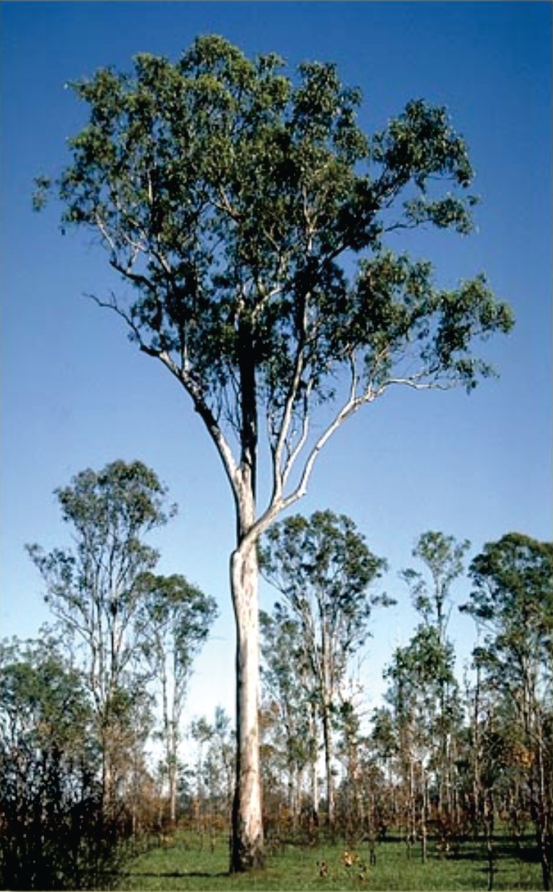
“Eucalyptus Drains Water and Lowers Water Table” – a myth or reality
- October 12, 2022
- 0


Eucalyptus Drains Water and Lowers Water Table” – a myth or reality B
by Dr. J.K. Rawat & R.K. Sapra
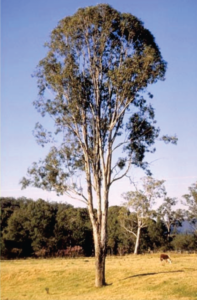 Eucalyptus has attracted adverse publicity inspite of its widespread utility. Even a layman, who is not concerned with it, makes negative comments like, “it sucks water and lowers water table” or “it spoils land.” In this brief note, an effort has been made to analyse this issue logically so that this myth is put to rest.
Eucalyptus has attracted adverse publicity inspite of its widespread utility. Even a layman, who is not concerned with it, makes negative comments like, “it sucks water and lowers water table” or “it spoils land.” In this brief note, an effort has been made to analyse this issue logically so that this myth is put to rest.
Eucalyptus, a native of Australia where more than 600 species of Eucalyptus are found, was brought to India in the late 18th century. It performed so well in the country that now it is one of the most popular agro-forestry species with the farmers of Punjab, Haryana and many other states.
The average annual productivity of natural forests in India is less than 2 m3/ha, while the average annual productivity of Eucalyptus plantations is 6-10 m3/ha on forestlands and 15-20 m3/ha on the farmlands. Based on trials carried out in Andhra Pradesh, the 7 years old clonal trees have given yield of 20 to 39 m3/ha/yr of wood.
Initially, most of the State Forest Departments in the country carried out extensive plantations of Eucalyptus even in forestlands. However, now they confine it to wastelands, road and canal strips and blank areas, as it is ecologically undesirable to replace natural forests with Eucalyptus plantations.
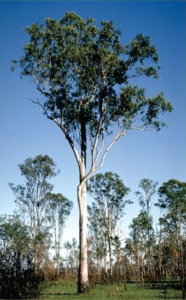
According to a study reported by a veteran forester and researcher, Sh. A. N. Chaturvedi, Eucalyptus is a very efficient utiliser of water. Eucalyptus requires 511 litre of water for producing one kilogram of wood, while the corresponding water consumption by other common trees of Haryana, Kikar and Shisham are 760 litre and 890 litre, respectively. Against this, the common agricultural crops of wheat and rice, respectively, consume 1,500 litre and 4,500 litre of water for producing 1 kg of grain.Eucalyptus is a fast-growing tree and needs only 8 to 10 years for maturity, but Kikar and Shisham take 20 and 60 years, respectively, for their maturity.
Therefore, due to its early maturity, Eucalyptus needs more water annually.However, its annual water requirement is much less than that of agricultural crops.One hectare of Eucalyptus crop that puts on a growth at the rate of 25 m3/ha/yr.,the annual requirement of water is about 128 lakh liters.
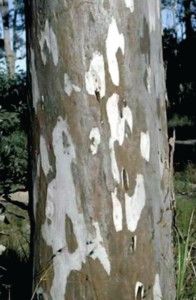 An equivalent piece of land that grows one crop each of wheat and rice during a year and gives an annual yield of 5.7 tonnes and 6.5 tonnes of grain, respectively, consumes about 378 lakh litre of water. This shows that annual water requirement of Eucalyptus is less than 37% of that of agricultural crops. Moreover, Eucalyptus crop also facilitates infiltration of rainwater into the ground, which helps in recharging of ground water table.
An equivalent piece of land that grows one crop each of wheat and rice during a year and gives an annual yield of 5.7 tonnes and 6.5 tonnes of grain, respectively, consumes about 378 lakh litre of water. This shows that annual water requirement of Eucalyptus is less than 37% of that of agricultural crops. Moreover, Eucalyptus crop also facilitates infiltration of rainwater into the ground, which helps in recharging of ground water table.
All vegetation, including agricultural and tree crops, use water only from 2 to 3 m of soil depth. The tube wells draw water from aquifers lying below an impermeable layer of soil or rocks occurring generally at depths more than 50 to 100 m. The tube well water replenishes soil moisture for the crops being irrigated.
The growth of tube well irrigation in Haryana has been phenomenal. During the last 35 years, the net irrigated area with canals increased only by 61 percent at an annual compounded rate of 1.4 percent. In case of tube wells in Haryana, the corresponding growth in their numbers hasbeen a whopping 550 percent at an annual compounded rate of 5.4 percent. The growth in tube well irrigation in the northern districts of 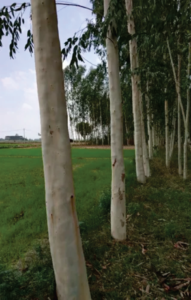 Haryana has been even much higher. This is the principal cause of lowering of water table in this region.
Haryana has been even much higher. This is the principal cause of lowering of water table in this region.
The scientific management of forestry in India is more than 100 years old, but Eucalyptus is the first tree which has been adopted by farmers for cultivation on farmlands due to its compatibility with agricultural crops, faster growth, shorter harvesting period and easier marketing.
If there were any significant adverse effect of this tree on the water availability or soil conditions, the farmers would not have continued to grow Eucalyptus so enthusiastically. It clearly shows that this blame against Eucalyptus is mostly mouthed by people who have little knowledge about it or related issues and have nothing to do with agriculture and tree farming.
































































